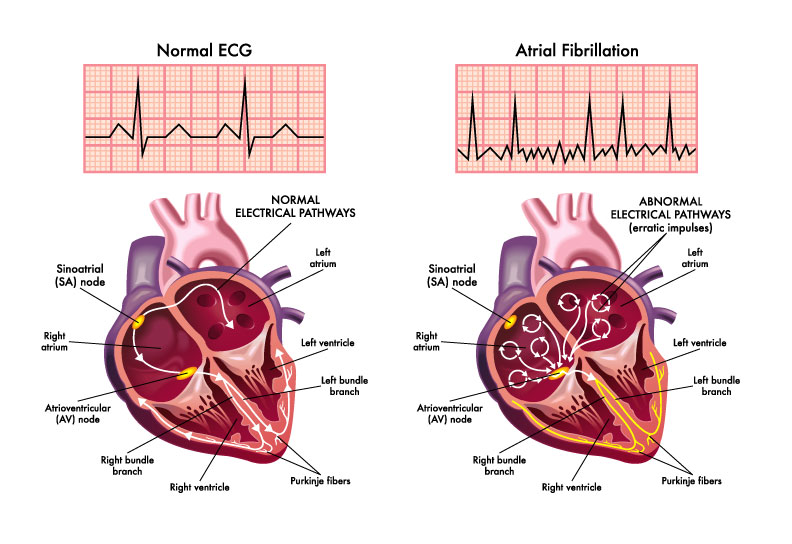
Atrial fibrillation, often called AFib or AF, is the most common type of treated heart arrhythmia. An arrhythmia is when the heart beats too slowly, too fast, or in an irregular way. It is also often described as a quivery or fluttery heartbeat. Estimates of the prevalence of AFib in the United States ranges from about 2.7 million to 6.1 million – that number is estimated to rise to 12.1 million in 2030.
When a person has AFib, the normal beating in the upper chambers of the heart (the two atria) is irregular, and blood doesn’t flow as well as it should from the atria to the lower chambers of the heart (the two ventricles). AFib may happen in brief episodes, or it may be a permanent condition.
Below is a helpful graphic showing what happens with atrial fibrillation. A normal heart is displayed on the left and atrial fibrillation on the right. Above each heart is an electrocardiogram (ECG or EKG), the machine used to detect and record the electrical activity of your heart.

Atrial Fibrillation Symptoms
Some people who have AFib don’t know they have it and don’t have any symptoms. Others may experience one or more of the following symptoms:
· Irregular heartbeat
· Heart palpitations (rapid, fluttering, or pounding)
· Lightheadedness
· Extreme fatigue
· Shortness of breath
· Chest pain
· Reduced ability to exercise
Types of Atrial Fibrillation
· Paroxysmal (Occasional Atrial Fibrillation). AFib symptoms come and go, usually lasting for a few minutes to hours. Sometimes symptoms occur for as long as a week and episodes can happen repeatedly. Symptoms might go away on their own. Some people with occasional AFib need treatment.
· Persistent. With this type of atrial fibrillation, the heart rhythm doesn't go back to normal on its own. If a person has AFib symptoms, cardioversion or treatment with medications may be used to restore and maintain a normal heart rhythm.
· Long-standing Persistent. This type of atrial fibrillation is continuous and lasts longer than 12 months.
· Permanent (Chronic): In this type of atrial fibrillation, the irregular heart rhythm can't be restored. Medications are needed to control the heart rate and to prevent blood clots.
· Valvular: This type affects people who have an artificial heart valve or valve disease like valvular stenosis (when one of your heart valves stiffens), or regurgitation (a valve isn’t closing property, which lets some blood flow the wrong way). Your chance of getting valvular AFib rises if you have mitral valve disease or artificial heart valves.
· Nonvalvular: This is atrial fibrillation that isn’t caused by a problem with a heart valve. It’s caused by other things, such as high blood pressure or an overactive thyroid gland. Doctors don’t always know what the cause is.
You're more likely to get nonvalvular AFib if you:
· Are older
· Have had high blood pressure for many years
· Have heart disease
· Drink large amounts of alcohol
· Have a family member with AFib
· Have sleep apnea
Complications from Atrial Fibrillation
While AFib itself usually isn't life-threatening, it's a serious medical condition that requires proper treatment to prevent stroke. In atrial fibrillation, the chaotic heart rhythm can cause blood to collect in the heart's upper chambers (atria) and form clots. If a blood clot in the left upper chamber (left atrium) breaks free from the heart area, it can travel to the brain and cause a stroke. The risk of stroke from atrial fibrillation increases as you grow older.
Treatment for atrial fibrillation may include healthy lifestyle changes, medications to control the heart’s rhythm and rate, therapy to reset the heart rhythm, and catheter procedures to block faulty heart signals. Blood thinners are also commonly prescribed to prevent blood clots and strokes in people with atrial fibrillation.
If you have any signs or symptoms of atrial fibrillation, make an appointment with Southwest Cardiac Associates. Our cardiologists know the importance of a timely evaluation and early diagnosis. At Southwest Cardiac Associates, we provide our patients with the highest quality of medical care based on state-of-the-art cardiovascular diagnosis, treatment, and prevention. Call 972-226-0505 to set up an appointment with one of our providers.